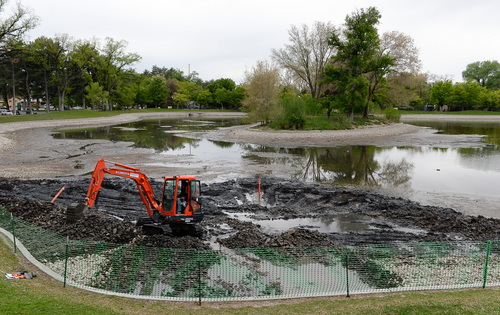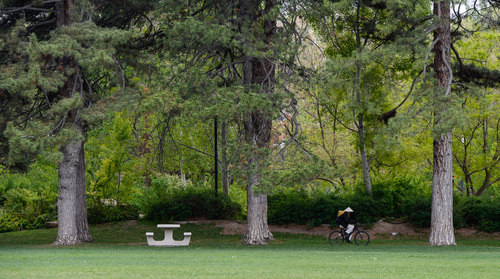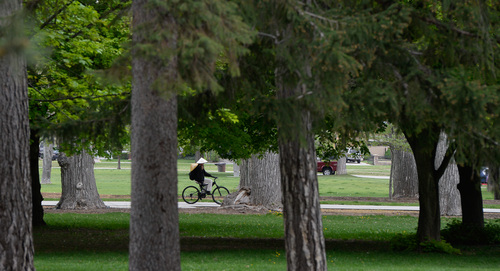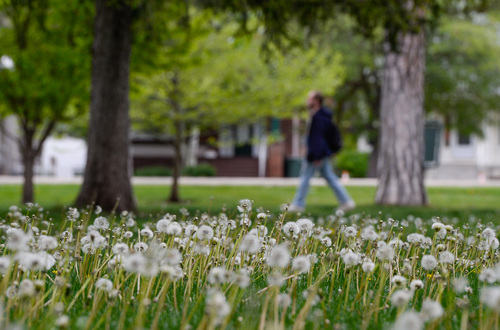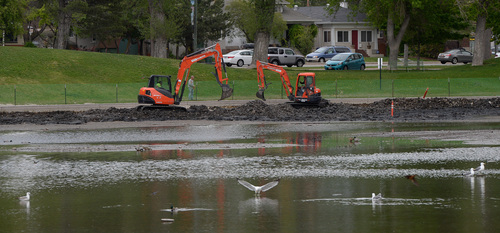This is an archived article that was published on sltrib.com in 2014, and information in the article may be outdated. It is provided only for personal research purposes and may not be reprinted.
Salt Lake City Mayor Ralph Becker didn't call his new $229 million annual budget proposal "The Year of the Employee" — but he could have. City employees will get a 3 percent raise across the board in the upcoming fiscal year that begins July 1.
It will be the first increase seen by many city employees in six years. In addition, part-time employees who worked 11 months of the year will be brought on full time.
"I consider this to be a necessary and prudent business decision," he said. "As high-tech as our day-to-day lives have become, this city runs on the high-tech efforts of 3,000 good people."
More good news — this time for property owners — the mayor is proposing no property tax increases, he said in his annual budget address to the City Council on Tuesday evening.
Over Becker's objections last year, the City Council raised property taxes by 13 percent. The increase was aimed at catching up on deferred maintenance on such things as roads, sidewalks and parks. Tuesday, the mayor faulted the council for not considering increased employee compensation last year.
"We should not develop a budget without the employees being the centerpiece of that budget," the mayor said.
On the deferred maintenance issue, Becker said his new budget calls for "set-asides" for maintenance of roads, sidewalks, parks, storm sewers and the like. "We have to take care of this as a base part of our budget," he said. "When we fall behind, it costs more to make repairs and improvements."
The hallmark of the mayor's administration has been transportation and clean air. For the upcoming fiscal year, 2014-15, that remains the case. Becker is steaming ahead with the design of a downtown streetcar. The administration also has applied for federal funding for an extension of the Sugar House Streetcar. The budget also outlines more bike lanes, including "protected" bike lanes separated physically from auto traffic. The first of those protected routes is slated to run south on 200 West from North Temple to 900 South.
In terms of clean air, the city will continue to convert its fleet to compressed natural gas (CNG) and continue making city buildings more efficient, among other things. But Salt Lake City can't clear the air by itself, Becker said.
He faulted the Utah Legislature for not passing five bills in the last session that he said would have made a significant difference in air quality along the Wasatch Front: more funding for public transit; availability of lower sulfur gasoline; stricter air standards than the federal government; increased gasoline taxes; and requirements for buildings to use energy more efficiently.
"The state should get serious about air quality," he said, "or give us at the local level the ability to do more."
The proposed budget also outlines "efficiencies" that include closing Fire Station 9 at the International Center. Presently the station gets only two calls per day, the mayor said. In addition, Salt Lake City will move away from sending fire engine crews to medical emergencies. SUV's will be equipped for such calls, he said.
Other proposed efficiencies include the closing of the city's Par 3 golf course in Rose Park — one of many proposals outlined in a 206-page report from the Florida-based National Golf Foundation. Other significant changes will be necessary and the report noted that the city's golf enterprise fund was not presently self-sustaining.
But the mayor said that golf is becoming less popular, while the public is demanding a host of other recreation options. "We have huge, changing recreational needs," he said. "If [the golf program] isn't meaningfully addressed in this budget, we'll have trouble in the future."
Further, he said he does not favor additional funding for the golf program from the general fund.
The budget outlines about $10 million in revenues above the 2013-14 budget for the fiscal year that ends June 30. Of that, $1.6 million is increased sales tax revenue. Some $2.3 million in one-time transfers into the general fund comes from other sources and about $6.2 million comes in grants – half of which are already tied to specific projects.
Becker said that Salt Lake City has come through the recession with vitality that is characterized 2,000 new residential units as well as new commercial construction downtown. But the mayor noted that for reasons he does not understand, the city isn't getting a parallel gain in property tax revenues.
As such, he will ask State Auditor John Dougall to analyze Salt Lake City's property tax structure to determine how the municipality can capture its fair share of taxes from new development so an "unfair burden is not placed on existing residences and businesses."
In summation, the mayor called his budget proposal "fiscally prudent" but one that meets head-on challenges of preparing Salt Lake City for the future while preserving the lifestyle that residents enjoy.
After the mayor's speech, Councilman Kyle LaMalfa said he is pleased Becker is bringing in the state auditor.
"For years, we've known something is not right with the way property taxes are collected," he said.
LaMalfa was joined by Councilwoman Lisa Adams in questioning whether Fire Station 9 should be closed. "We want to make sure the needs in that area are met," LaMalfa said.
Adams and Councilwoman Erin Mendenhall praised Becker for giving employees raises after years without them. But Councilman Luke Garrott was reserving his applause for until he reviews the budget further.
"We raised taxes last year for infrastructure improvements," he said. "Now the mayor is giving that tax increase to the employees. That's the trade-off. With no tax hike last year, he couldn't give raises now."
The City Council must pass its 2014-15 annual budget by June 22.


